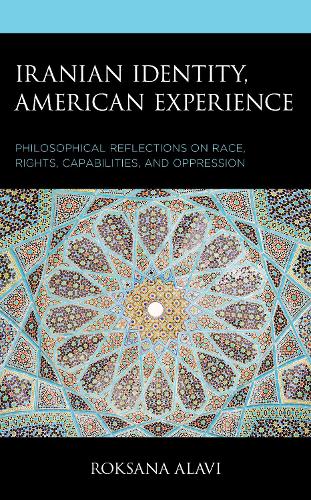
Iranian Identity, American Experience: Philosophical Reflections on Race, Rights, Capabilities, and Oppression
(Paperback)
Available Formats
Publishing Details
Iranian Identity, American Experience: Philosophical Reflections on Race, Rights, Capabilities, and Oppression
By (Author) Roksana Alavi
Bloomsbury Publishing PLC
Lexington Books
27th March 2023
United States
Classifications
Professional and Scholarly
Non Fiction
Human rights, civil rights
Social discrimination and social justice
Ethnic groups and multicultural studies
Social and cultural anthropology
305.89155073
Physical Properties
Paperback
166
Width 151mm, Height 228mm, Spine 13mm
254g
Description
Iranian Identity, American Experience: Philosophical Reflections on Race, Rights, Capabilities and Oppression is a multidisciplinary study of oppression using the Iranian American community as its case study. In current studies of oppression, there is little philosophical analysis or a theoretical framework to think about race from the perspective of an immigrant community in the United States that appears to be educated and affluent. Iranian Identity, American Experience fills this gap. Alavi discusses a theory of oppression that addresses not only the external oppression inflicted on people of color but also the everyday actions that leave them in oppressive situations. The book ends with suggestions for addressing oppression both individually and as a collective and for fighting to minimize its harms.
Reviews
In this brief but insightful and clearly organized discussion, Iranian American Alavi reviews and evaluates philosophical literature to develop her own theory of oppression, which she applies to analyzing the identities and social conditions of Iranian migrs and their descendants in the US. Alavi focuses on experiences, such as stereotyping, discrimination, and self-hate, that coerce assimilation or isolation and inhibit individuals from developing capabilities on the basis of their group membership. She argues that a distinction must be drawn between thriving economically, as Iranian Americans are thought to do, and being free of the effects of racism and discrimination. Indeed, the economic success of Iranian immigrants may camouflage the ways in which the population as a whole is oppressed by experiences of exploitation, marginalization, powerlessness, cultural imperialism, and violence. Alavi also notes the significance of class and gender differences and discusses how skin color, language ability, education, job skills, and geographical location are factors that can systematically and structurally limit people from developing capabilities and accessing the benefits of equality. Although Alavis philosophical analysis only minimally examines socioeconomic data and cultural specifics, she makes a good case for understanding, and also potentially eliminating, the effects of oppression. Recommended. General readers through faculty; professionals. * Choice Reviews *
Roksana Alavi beautifully interweaves the personal and the political to chronicle the racialization of Iranian Americans and capture the ways that xenophobia functions in America. This book explores the stereotypes ingrained within the American psyche via blockbuster movies such as Argo, Shahs of Sunset, and Not Without My Daughter. Using the capabilities approach to generate rights, Alavi remains committed to issues of justice and equality and does a wonderful job of carving a path forward for eradicating oppression. -- Saba Fatima, Southern Illinois University Edwardsville
Alavi shows that the Iranian American experience is an underdiscussed and rich source for considering issues of race, identity, and discrimination. Her reflections on 'self-shame' and divided immigrant identities are especially interesting. -- Adam Hosein, Northeastern University
Author Bio
Roksana Alavi is associate (term) professor of interdisciplinary studies at the University of Oklahoma College of Professional and Continuing Studies and affiliate faculty member in the philosophy department and Iranian studies and women and gender studies programs.
